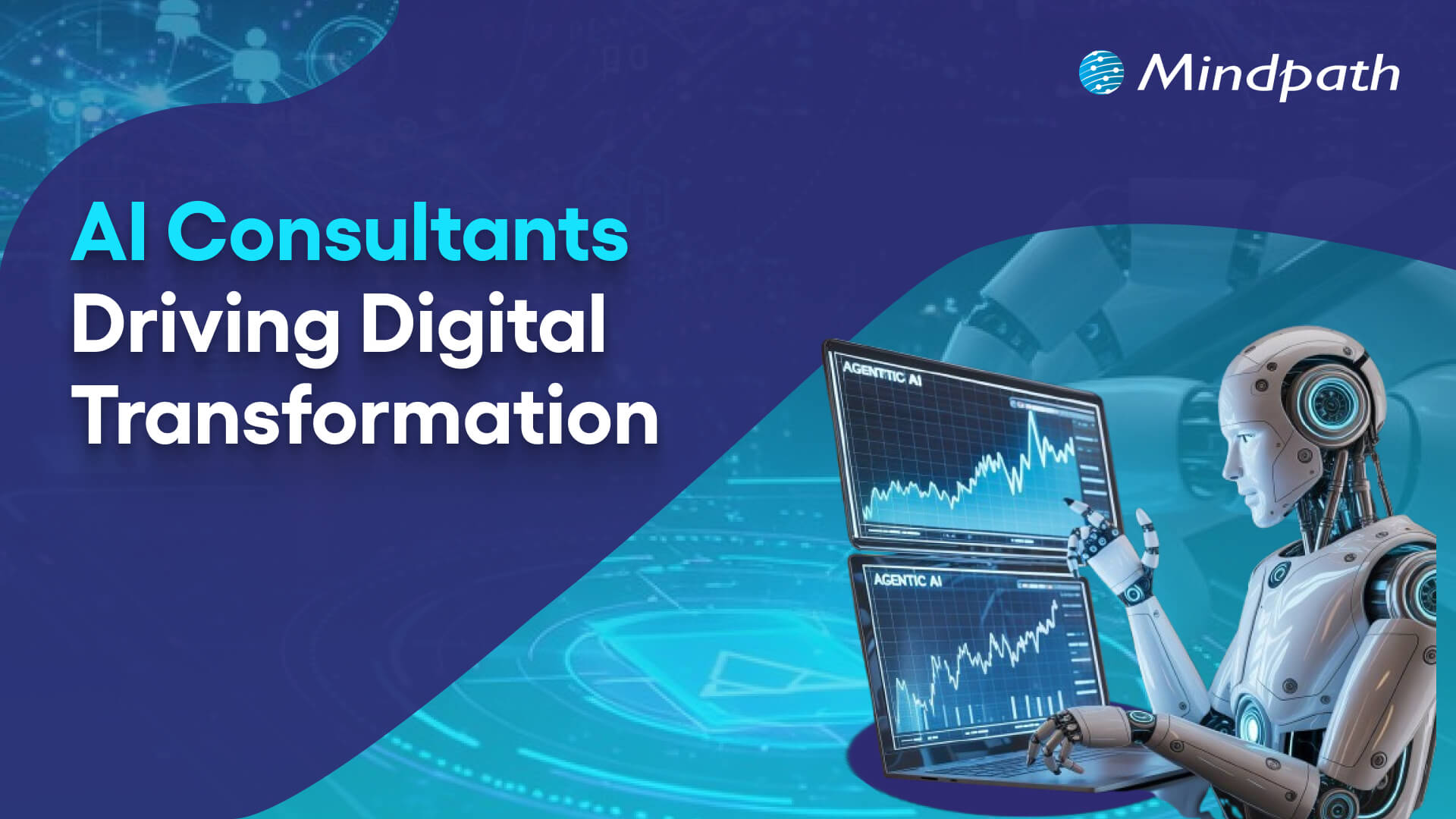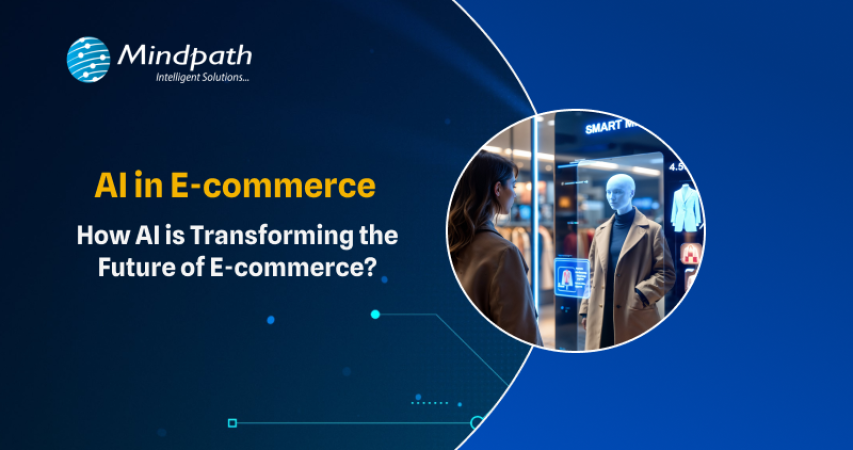Have you ever thought how do online stores seem to know what exactly you are looking for? How do these stores make your online shopping so much easier by showing you the perfect product at the perfect time? Well, it’s not just by luck, but the power of artificial intelligence which is changing the way we shop online. But how exactly is AI in e-commerce shaping the future of online shopping?
In today’s tech world, artificial intelligence (AI) is making an influential impact across many industries. Businesses are using AI to improve their services and reach more customers. Among all the industries, e-commerce is seeing a major conversion with the help of AI, as it helps in creating personalized shopping experience, increasing sales and offering better customer support. AI also helps retailers to understand customer behavior, recommend the perfect choices as well as build stronger connections with them.
But this raises the question: how can AI help businesses in the e-commerce sector improve their operations and enhance customer experience? Curious to know? Let’s dive in!
Want to transform your e-commerce website with AI to avail its revolutionary benefits? At Mindpath, we offer AI development services designed to elevate your business and enhance customer experiences.
Understanding the Role of AI in E-commerce
AI in e-commerce refers to the use of artificial intelligence technologies to make online shopping better and easier. These systems can learn from customer’s behavior, answer their questions automatically, and also suggest products that people might like. It is like having a digital assistant that supports both the business and the shoppers.
E-commerce stores use AI in many simple yet powerful ways. It helps show products that match a customer’s taste, runs chatbots for quick replies, and manages inventories by predicting what people might like to buy. It also helps with creating smart ads and adjusting prices based on demand. Using AI helps online businesses grow faster. It improves how customers shop by giving them a more personal and easy experience. It also saves time and money for the business by handling routine tasks. In the long run, it builds trust, keeps customers coming back, and helps the store stay ahead of the competition.
The Benefits of AI in E-commerce
With the rise of artificial intelligence in e-commerce, the ability to predict trends, analyze data and personalize experience has become more easily approachable. Businesses now can improve customer interactions, amend tasks and stay ahead in a competitive market with AI. Here are some of the key benefits of AI in e-commerce businesses.
1. Preventing Fraud
E-commerce businesses usually face a huge challenge with online fraud, but with e-commerce AI tools, these frauds can be prevented easily. AI can quickly spot any suspicious activity by understanding the patterns and detecting anything unusual such as incorrect shipping addresses or any other signs of fraud. Also, it can detect fraud even while reviewing thousands of transactions at once which helps to prevent losses and keeps the store guarded. AI has the ability to learn and improve which can benefit in continuously strengthening its fraud detection, helping you to focus on growing your business.
2. Improving Site Search
AI in e-commerce is making site search smarter and more accurate. AI can better understand what customers are looking for due to the advancements in natural language processing. Whenever a customer types to search for something, AI can automatically fix spelling mistakes, suggest synonyms and even fill missing words. It can also help customers in visual search as well search voice search options. With the help of these smart features, AI can reduce customer’s frustration and provides them exactly what they want, improving shopping experience and giving businesses a competitive advantage in the e-commerce market.
3. Simplifying Inventory Management
With artificial intelligence in e-commerce, inventory management has become much easier. AI can predict how much stock you need based on past data and trends which helps to avoid overstocking or running out of items. AI also makes warehouse tasks smoother as bots can help store and retrieve products quickly, saving time and effort. This technology makes managing stock more accurate and efficient, allowing businesses to focus on growing while AI handles the tricky parts of inventory management.
4. Reducing Manual Tasks
AI can reduce the need for manual labor by taking over repetitive tasks in e-commerce. Instead of employees handling simple, time-consuming tasks, AI automates these processes and saves valuable time and improves competence. By handling tasks like answering basic customer queries, processing orders, and managing inventory, e-commerce AI allows businesses to focus on more important activities. While this may change the roles of human workers, it helps businesses cut costs and enhance productivity, making overall operations more streamlined and effective.
Real World Use-Cases of AI in E-commerce
Artificial intelligence is already making a big impact in the e-commerce world. Many well-known online stores are utilizing it in smart ways to improve the way people shop and how smoothly their systems run. Here are some of the real-world examples showing how AI is used every day in e-commerce.
1. Product Discovery and Recommendations
AI in e-commerce is shaping how customers discover products online. Websites like Amazon, Shein, Etsy and eBay show products based on the browsing and purchasing history of their customer with personalized product recommendations. For instance, if you search for a purse on Amazon, it will suggest other similar brands of purses that you may like. This AI-driven system makes shopping more enjoyable and also boosts sales and customer trust. E-commerce advertising also benefits from this, as targeted recommendations lead to more engagement, improving overall customer experience.
2. Improves Customer Service
Customer service is improving with the help of AI-powered chatbots and virtual assistants, which can quick and personalized support. Artificial intelligence in retail stores helps businesses automate responses, answer customer queries, and offer tailored solutions. By using technologies like machine learning and natural language processing, AI can understand customer inquiries and offer accurate responses. For example, H&M uses AI-powered chatbots to help customers with product details, availability, sizing and even delivery options. This makes customer shopping easier and helps businesses deliver faster and efficient customer service.
3. Voice Commerce
Voice commerce, also known as V-commerce, is changing how we shop online with the help of AI. By using voice assistance like Amazon’s Alexa, Google Home, and Walmart’s voice services, customers can shop simply by speaking. These AI-driven assistants understand commands through natural language processing (NLP) and can offer tailored product recommendations. They also help customers with order updates and product inquiries. AI in e-commerce examples include big companies like Amazon, Walmart, and Google Shopping that are leveraging voice technology to improve shopping experience.
4. Smart Pricing Strategy
The role of AI in e-commerce is changing the pricing strategies by allowing price adjustments based on various factors like demand, supply, and competitor prices. AI uses data analysis to predict future trends and automatically modify prices. Major companies like Amazon, Walmart, and Best Buy have adopted AI to implement smart pricing strategies which allow them to remain competitive, attract more customers and improve satisfaction by offering relevant prices. These examples demonstrate how advanced technology can optimize pricing in the ever-evolving market.
5. Optimizing Logistics
In e-commerce, smart logistics powered by AI improves delivery efficiency by using real-time data and predictive analytics. This technology helps businesses track shipments, prevent delays, and make better decisions. For instance, Cainiao, Alibaba’s logistics arm, uses AI to ensure deliveries within 24 hours across China. Similarly, Amazon employs AI to optimize delivery routes, reducing costs and speeding up deliveries. These uses of artificial intelligence in daily life are making logistics smarter, cutting costs, and providing a better customer experience.
Ready to Adopt AI Revolution?
Artificial intelligence is revolutionizing e-commerce by enhancing customer experiences, streamlining operations, and driving innovation. From smart pricing and personalized recommendations to AI-powered customer service and logistics, the role of AI in e-commerce is transforming the industry in powerful ways. As technology continues to evolve, businesses that embrace AI will stay ahead of the curve, offering better services and smarter solutions.
At Mindpath, we provide top-tier AI development services to help businesses thrive in the world of e-commerce. Our AI solutions are designed to improve customer experience, streamline operations, and boost sales. From personalized recommendations and dynamic pricing to efficient inventory management and smart logistics, we integrate AI to make your e-commerce platform smarter and more efficient. Trust Mindpath to bring AI-powered innovations that will optimize your business and help you stay ahead in the ever-evolving e-commerce landscape.
















